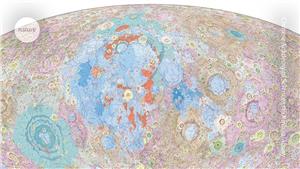Emojis are interpreted differently based on gender and culture: Study
Men struggle to grasp the meaning of emoji faces because they are less sensitive than women, a study has found. Researchers asked 500 men and women from the UK and China to identify the emotions being portrayed in a series of the little yellow icons popular in text messages and social media posts. They also found that British people had more difficulty recognizing the 'disgusted' face, possibly because the infamously reserved Brits are less likely to express that emotion, holding their distaste closer to the vest. Study participants looked at emojis representing happiness, disgust, fear, sadness, surprise and anger. +2 View gallery Copy link to paste in your message Researchers asked 500 men and women from the UK and China to identify the emotions portrayed in a series of emojis, those little yellow icons popular in text messages. Women edged out men as more perceptive in reading the icons' meaning +2 View gallery Copy link to paste in your message Study participants looked at emojis representing happiness, disgust, fear, sadness, surprise and anger - across multiple tech operating systems which vary in emoji design (above) TRENDING ![]() NASA and ESA battle for the moon's water 1.5k viewing now
NASA and ESA battle for the moon's water 1.5k viewing now ![]() Scientists reveal how stingray fell pregnant in aquarium without male 50.1k viewing now
Scientists reveal how stingray fell pregnant in aquarium without male 50.1k viewing now ![]() What will happen to the UK if the Gulf Stream collapses in 2025? 769 viewing now
What will happen to the UK if the Gulf Stream collapses in 2025? 769 viewing now ![]() The Amazon rainforest could collapse by 2050, scientists say 489 viewing now
The Amazon rainforest could collapse by 2050, scientists say 489 viewing now ![]() Scientists discover 'alien metals' in ancient gold-plated treasures 180 viewing now Women did better across the board. The researchers said this may be because women are more sensitively tuned to recognizing the emotions of human babies. Yihua Chen, of Nottingham University, said: 'Women demonstrate higher accuracy in emotion recognition than men. One potential explanation is the "primary caretaker hypothesis."' 'Accurate and rapid identification of infant emotions, especially facial expressions, is a very important part of infant care, as infant mortality has generally been high throughout human evolution.' Advertisement Generally, the Westerners did better than the Chinese at recognizing emoji emotions but struggled with the 'disgusted' face, which has down-turned features with a wobbly mouth, furrowed brow and clenched eyes. The researchers said this may be due to 'specific emotional experiences in different cultures.' They also noted that in China, the 'smile' face was often used to represent emotions other than happiness. The study was published in science journal Plos One. Britain is one of the most emoji-hungry nations on earth, with half of us sending at least one every day. They are also popular across age groups, with little variation between the generations. The researchers found that English posts on X, formerly Twitter, were also littered with emojis - more so than on China's Weibo social media platform. Emojis are a standard feature on smartphones and computers. The cartoony faces expressing various emotions date back to the 1990s and have since become a cultural fixture. In 2015, in fact, Oxford Dictionaries made the 'crying with laughter' emoji its 'word of the year.' Casper Grathwohl, vice president of Oxford University Press, said at the time: 'Traditional alphabet scripts have been struggling to meet the rapid-fire, visually focused demands of 21st century communication.' 'It's not surprising that a pictographic script like emoji has stepped in to fill those gaps - it's flexible, immediate, and infuses tone beautifully.' 'As a result,' Grathwohl concluded, 'emoji are becoming an increasingly rich form of communication, one that transcends linguistic borders.'https://www.dailymail.co.uk/sciencetech/article-13084647/emoji-meaning-study-gender-culture-age-viewer.html?ito=email_share_article-image-shareMost Read ArticlesScientists solve the case of the 'virgin stingray' who became pregnant despite not sharing a tank with her own species - and it WASN'T 'shark shenanigans' as fearedhttps://www.dailymail.co.uk/sciencetech/article-13085625/Scientists-reveal-stingray-pregnant-aquarium-despite-not-sharing-tank-male-species-eight-years.html?email_share_article-image-share_most-read-articles'The outcome could be extinction': Elon Musk-backed researcher warns there is NO proof AI can be controlled - and says tech should be shelved NOWhttps://www.dailymail.co.uk/sciencetech/article-13080275/The-outcome-extinction-Elon-Musk-backed-researcher-warns-NO-proof-AI-controlled-says-tech-shelved-NOW.html?email_share_article-image-share_most-read-articlesFlying taxis will be in Dubai skies next year: Incredible video reveals how passengers will be whisked through the air at 198mph - with a flight from the airport to the Palm taking just 10 minuteshttps://www.dailymail.co.uk/sciencetech/article-13082085/Flying-taxis-Dubai-2025.html?email_share_article-image-share_most-read-articles'>https://www.dailymail.co.uk/sciencetech/article-13085625/Scientists-reveal-stingray-pregnant-aquarium-despite-not-sharing-tank-male-species-eight-years.html?email_share_article-image-share_most-read-articles'The outcome could be extinction': Elon Musk-backed researcher warns there is NO proof AI can be controlled - and says tech should be shelved NOWhttps://www.dailymail.co.uk/sciencetech/article-13080275/The-outcome-extinction-Elon-Musk-backed-researcher-warns-NO-proof-AI-controlled-says-tech-shelved-NOW.html?email_share_article-image-share_most-read-articlesFlying taxis will be in Dubai skies next year: Incredible video reveals how passengers will be whisked through the air at 198mph - with a flight from the airport to the Palm taking just 10 minuteshttps://www.dailymail.co.uk/sciencetech/article-13082085/Flying-taxis-Dubai-2025.html?email_share_article-image-share_most-read-articles'>
Scientists discover 'alien metals' in ancient gold-plated treasures 180 viewing now Women did better across the board. The researchers said this may be because women are more sensitively tuned to recognizing the emotions of human babies. Yihua Chen, of Nottingham University, said: 'Women demonstrate higher accuracy in emotion recognition than men. One potential explanation is the "primary caretaker hypothesis."' 'Accurate and rapid identification of infant emotions, especially facial expressions, is a very important part of infant care, as infant mortality has generally been high throughout human evolution.' Advertisement Generally, the Westerners did better than the Chinese at recognizing emoji emotions but struggled with the 'disgusted' face, which has down-turned features with a wobbly mouth, furrowed brow and clenched eyes. The researchers said this may be due to 'specific emotional experiences in different cultures.' They also noted that in China, the 'smile' face was often used to represent emotions other than happiness. The study was published in science journal Plos One. Britain is one of the most emoji-hungry nations on earth, with half of us sending at least one every day. They are also popular across age groups, with little variation between the generations. The researchers found that English posts on X, formerly Twitter, were also littered with emojis - more so than on China's Weibo social media platform. Emojis are a standard feature on smartphones and computers. The cartoony faces expressing various emotions date back to the 1990s and have since become a cultural fixture. In 2015, in fact, Oxford Dictionaries made the 'crying with laughter' emoji its 'word of the year.' Casper Grathwohl, vice president of Oxford University Press, said at the time: 'Traditional alphabet scripts have been struggling to meet the rapid-fire, visually focused demands of 21st century communication.' 'It's not surprising that a pictographic script like emoji has stepped in to fill those gaps - it's flexible, immediate, and infuses tone beautifully.' 'As a result,' Grathwohl concluded, 'emoji are becoming an increasingly rich form of communication, one that transcends linguistic borders.'https://www.dailymail.co.uk/sciencetech/article-13084647/emoji-meaning-study-gender-culture-age-viewer.html?ito=email_share_article-image-shareMost Read ArticlesScientists solve the case of the 'virgin stingray' who became pregnant despite not sharing a tank with her own species - and it WASN'T 'shark shenanigans' as fearedhttps://www.dailymail.co.uk/sciencetech/article-13085625/Scientists-reveal-stingray-pregnant-aquarium-despite-not-sharing-tank-male-species-eight-years.html?email_share_article-image-share_most-read-articles'The outcome could be extinction': Elon Musk-backed researcher warns there is NO proof AI can be controlled - and says tech should be shelved NOWhttps://www.dailymail.co.uk/sciencetech/article-13080275/The-outcome-extinction-Elon-Musk-backed-researcher-warns-NO-proof-AI-controlled-says-tech-shelved-NOW.html?email_share_article-image-share_most-read-articlesFlying taxis will be in Dubai skies next year: Incredible video reveals how passengers will be whisked through the air at 198mph - with a flight from the airport to the Palm taking just 10 minuteshttps://www.dailymail.co.uk/sciencetech/article-13082085/Flying-taxis-Dubai-2025.html?email_share_article-image-share_most-read-articles'>https://www.dailymail.co.uk/sciencetech/article-13085625/Scientists-reveal-stingray-pregnant-aquarium-despite-not-sharing-tank-male-species-eight-years.html?email_share_article-image-share_most-read-articles'The outcome could be extinction': Elon Musk-backed researcher warns there is NO proof AI can be controlled - and says tech should be shelved NOWhttps://www.dailymail.co.uk/sciencetech/article-13080275/The-outcome-extinction-Elon-Musk-backed-researcher-warns-NO-proof-AI-controlled-says-tech-shelved-NOW.html?email_share_article-image-share_most-read-articlesFlying taxis will be in Dubai skies next year: Incredible video reveals how passengers will be whisked through the air at 198mph - with a flight from the airport to the Palm taking just 10 minuteshttps://www.dailymail.co.uk/sciencetech/article-13082085/Flying-taxis-Dubai-2025.html?email_share_article-image-share_most-read-articles'>

 NASA and ESA battle for the moon's water 1.5k viewing now
NASA and ESA battle for the moon's water 1.5k viewing now  Scientists reveal how stingray fell pregnant in aquarium without male 50.1k viewing now
Scientists reveal how stingray fell pregnant in aquarium without male 50.1k viewing now  What will happen to the UK if the Gulf Stream collapses in 2025? 769 viewing now
What will happen to the UK if the Gulf Stream collapses in 2025? 769 viewing now  The Amazon rainforest could collapse by 2050, scientists say 489 viewing now
The Amazon rainforest could collapse by 2050, scientists say 489 viewing now  Scientists discover 'alien metals' in ancient gold-plated treasures 180 viewing now Women did better across the board. The researchers said this may be because women are more sensitively tuned to recognizing the emotions of human babies. Yihua Chen, of Nottingham University, said: 'Women demonstrate higher accuracy in emotion recognition than men. One potential explanation is the "primary caretaker hypothesis."' 'Accurate and rapid identification of infant emotions, especially facial expressions, is a very important part of infant care, as infant mortality has generally been high throughout human evolution.' Advertisement Generally, the Westerners did better than the Chinese at recognizing emoji emotions but struggled with the 'disgusted' face, which has down-turned features with a wobbly mouth, furrowed brow and clenched eyes. The researchers said this may be due to 'specific emotional experiences in different cultures.' They also noted that in China, the 'smile' face was often used to represent emotions other than happiness. The study was published in science journal Plos One. Britain is one of the most emoji-hungry nations on earth, with half of us sending at least one every day. They are also popular across age groups, with little variation between the generations. The researchers found that English posts on X, formerly Twitter, were also littered with emojis - more so than on China's Weibo social media platform. Emojis are a standard feature on smartphones and computers. The cartoony faces expressing various emotions date back to the 1990s and have since become a cultural fixture. In 2015, in fact, Oxford Dictionaries made the 'crying with laughter' emoji its 'word of the year.' Casper Grathwohl, vice president of Oxford University Press, said at the time: 'Traditional alphabet scripts have been struggling to meet the rapid-fire, visually focused demands of 21st century communication.' 'It's not surprising that a pictographic script like emoji has stepped in to fill those gaps - it's flexible, immediate, and infuses tone beautifully.' 'As a result,' Grathwohl concluded, 'emoji are becoming an increasingly rich form of communication, one that transcends linguistic borders.'https://www.dailymail.co.uk/sciencetech/article-13084647/emoji-meaning-study-gender-culture-age-viewer.html?ito=email_share_article-image-shareMost Read ArticlesScientists solve the case of the 'virgin stingray' who became pregnant despite not sharing a tank with her own species - and it WASN'T 'shark shenanigans' as fearedhttps://www.dailymail.co.uk/sciencetech/article-13085625/Scientists-reveal-stingray-pregnant-aquarium-despite-not-sharing-tank-male-species-eight-years.html?email_share_article-image-share_most-read-articles'The outcome could be extinction': Elon Musk-backed researcher warns there is NO proof AI can be controlled - and says tech should be shelved NOWhttps://www.dailymail.co.uk/sciencetech/article-13080275/The-outcome-extinction-Elon-Musk-backed-researcher-warns-NO-proof-AI-controlled-says-tech-shelved-NOW.html?email_share_article-image-share_most-read-articlesFlying taxis will be in Dubai skies next year: Incredible video reveals how passengers will be whisked through the air at 198mph - with a flight from the airport to the Palm taking just 10 minuteshttps://www.dailymail.co.uk/sciencetech/article-13082085/Flying-taxis-Dubai-2025.html?email_share_article-image-share_most-read-articles'>https://www.dailymail.co.uk/sciencetech/article-13085625/Scientists-reveal-stingray-pregnant-aquarium-despite-not-sharing-tank-male-species-eight-years.html?email_share_article-image-share_most-read-articles'The outcome could be extinction': Elon Musk-backed researcher warns there is NO proof AI can be controlled - and says tech should be shelved NOWhttps://www.dailymail.co.uk/sciencetech/article-13080275/The-outcome-extinction-Elon-Musk-backed-researcher-warns-NO-proof-AI-controlled-says-tech-shelved-NOW.html?email_share_article-image-share_most-read-articlesFlying taxis will be in Dubai skies next year: Incredible video reveals how passengers will be whisked through the air at 198mph - with a flight from the airport to the Palm taking just 10 minuteshttps://www.dailymail.co.uk/sciencetech/article-13082085/Flying-taxis-Dubai-2025.html?email_share_article-image-share_most-read-articles'>
Scientists discover 'alien metals' in ancient gold-plated treasures 180 viewing now Women did better across the board. The researchers said this may be because women are more sensitively tuned to recognizing the emotions of human babies. Yihua Chen, of Nottingham University, said: 'Women demonstrate higher accuracy in emotion recognition than men. One potential explanation is the "primary caretaker hypothesis."' 'Accurate and rapid identification of infant emotions, especially facial expressions, is a very important part of infant care, as infant mortality has generally been high throughout human evolution.' Advertisement Generally, the Westerners did better than the Chinese at recognizing emoji emotions but struggled with the 'disgusted' face, which has down-turned features with a wobbly mouth, furrowed brow and clenched eyes. The researchers said this may be due to 'specific emotional experiences in different cultures.' They also noted that in China, the 'smile' face was often used to represent emotions other than happiness. The study was published in science journal Plos One. Britain is one of the most emoji-hungry nations on earth, with half of us sending at least one every day. They are also popular across age groups, with little variation between the generations. The researchers found that English posts on X, formerly Twitter, were also littered with emojis - more so than on China's Weibo social media platform. Emojis are a standard feature on smartphones and computers. The cartoony faces expressing various emotions date back to the 1990s and have since become a cultural fixture. In 2015, in fact, Oxford Dictionaries made the 'crying with laughter' emoji its 'word of the year.' Casper Grathwohl, vice president of Oxford University Press, said at the time: 'Traditional alphabet scripts have been struggling to meet the rapid-fire, visually focused demands of 21st century communication.' 'It's not surprising that a pictographic script like emoji has stepped in to fill those gaps - it's flexible, immediate, and infuses tone beautifully.' 'As a result,' Grathwohl concluded, 'emoji are becoming an increasingly rich form of communication, one that transcends linguistic borders.'https://www.dailymail.co.uk/sciencetech/article-13084647/emoji-meaning-study-gender-culture-age-viewer.html?ito=email_share_article-image-shareMost Read ArticlesScientists solve the case of the 'virgin stingray' who became pregnant despite not sharing a tank with her own species - and it WASN'T 'shark shenanigans' as fearedhttps://www.dailymail.co.uk/sciencetech/article-13085625/Scientists-reveal-stingray-pregnant-aquarium-despite-not-sharing-tank-male-species-eight-years.html?email_share_article-image-share_most-read-articles'The outcome could be extinction': Elon Musk-backed researcher warns there is NO proof AI can be controlled - and says tech should be shelved NOWhttps://www.dailymail.co.uk/sciencetech/article-13080275/The-outcome-extinction-Elon-Musk-backed-researcher-warns-NO-proof-AI-controlled-says-tech-shelved-NOW.html?email_share_article-image-share_most-read-articlesFlying taxis will be in Dubai skies next year: Incredible video reveals how passengers will be whisked through the air at 198mph - with a flight from the airport to the Palm taking just 10 minuteshttps://www.dailymail.co.uk/sciencetech/article-13082085/Flying-taxis-Dubai-2025.html?email_share_article-image-share_most-read-articles'>https://www.dailymail.co.uk/sciencetech/article-13085625/Scientists-reveal-stingray-pregnant-aquarium-despite-not-sharing-tank-male-species-eight-years.html?email_share_article-image-share_most-read-articles'The outcome could be extinction': Elon Musk-backed researcher warns there is NO proof AI can be controlled - and says tech should be shelved NOWhttps://www.dailymail.co.uk/sciencetech/article-13080275/The-outcome-extinction-Elon-Musk-backed-researcher-warns-NO-proof-AI-controlled-says-tech-shelved-NOW.html?email_share_article-image-share_most-read-articlesFlying taxis will be in Dubai skies next year: Incredible video reveals how passengers will be whisked through the air at 198mph - with a flight from the airport to the Palm taking just 10 minuteshttps://www.dailymail.co.uk/sciencetech/article-13082085/Flying-taxis-Dubai-2025.html?email_share_article-image-share_most-read-articles'>







